The Narrative Lectionary brings us to John 7:37-52 this week. I am preaching this text, and it is really hard to narrow my focus. Allow me, in this post, to simply comment on the text using images from A Cartoonist’s Guide to John 7 and words.

in John 6, Jesus was up in Capernaum, in Galilee, in a synagogue talking about how he is the bread of life and that his disciples must eat his flesh and drink his blood in order to know the abundant life that God intends for all of us.
The scene changes in chapter 7 and the author tells us that it was time for the feast of Tabernacles. It is also known as the Feast of Booths. It was a week-long festival where everyone would gather in Jerusalem at the end of the harvest and celebrate. There are two unique features that are important for our reading today.
First, the people would pitch tents or make temporary dwellings out of branches and palm leaves. Jerusalem was transformed into a massive tent city. This helped the people remember that they lived in tents while God led them through the wilderness in the story of the Exodus.
Second, on the last day of the feast, the priest would pour water over the altar at the temple and let it pour down the steps. This signified the way God provided water out of the rock in the desert in Numbers 20 and the way that God continually provides rain for the crops.
That’s the setting.
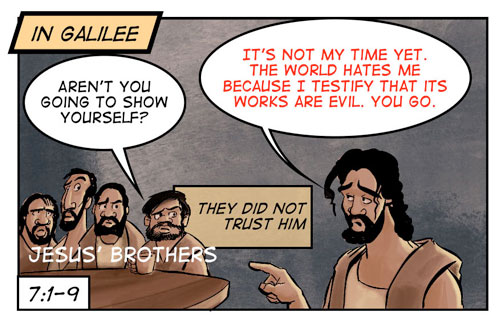
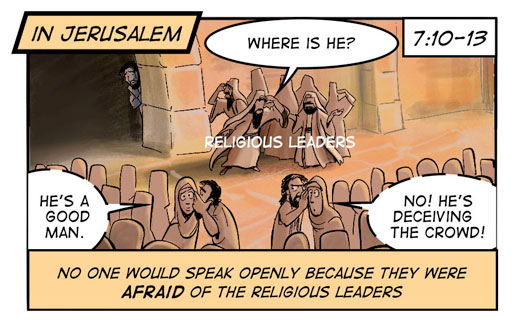
When you look around your world today, does it seem like some of the things you once thought were stable are falling apart?
That is how the readers of John’s Gospel felt. When this Gospel was written, the Temple in Jerusalem had already been destroyed by the Roman army. The Jewish people had been slaughtered and scattered around the world.
I think of our newest friends who recently fled Afghanistan, and all those from around the world, whose homes and way of life have been destroyed by political powers; they are lost and afraid.
When we read the Gospel of John, we must try to see it and hear it through these lenses.
In John 7:1-9 we see how Jesus’ brothers highlight the fact that Jesus is in danger because he’s causing problems.
In John 7:10-13 we see that the religious leaders are waiting to pounce on him and the crowd is divided and scared.
Just like us.


Jesus is from the wrong place.
Jesus shows up and starts teaching at the Temple. Everyone is amazed at his teaching; even the religious leaders. They said, in John 7:15
“How does this man have such learning, when he has never been taught?”
In John 7:41
Others said, “This is the Messiah.” But some asked, “Surely the Messiah does not come from Galilee, does he?
The people had a very particular portrait of what the Messiah would look like, where he would be born, what accent he would have, what kind of credentials he would have.
Jesus didn’t fit any of them.
Here’s something for us (read white, suburban, middle-class, Upper Mid-West USA audience here) to think about. If Jesus were to show up today, in our congregation, he wouldn’t fit in. He’d have brown skin, dark eyes, and would speak with a middle eastern accent. The truth is, that if you saw him walking down the street, you’d probably walk on the other side.
He’s not like us. He’s from the “wrong place.”
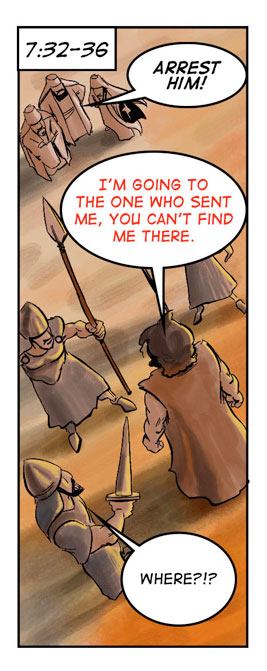
Jesus is a threat to power.
Every time Jesus encounters the leaders of the religious establishment he intentionally pushes their buttons. He heals on the Sabbath. He claims to be the Son of God. He teaches with authority as he accuses the leaders of misinterpreting the Law of Moses and misrepresenting the vision of God for the world.
Look how the people are responding.
John 7:25–26 NRSV
Now some of the people of Jerusalem were saying, “Is not this the man whom they are trying to kill? And here he is, speaking openly, but they say nothing to him! Can it be that the authorities really know that this is the Messiah?
That was it. The leaders send the the Temple police to arrest this rabble rouser. But, the police are so amazed at him. They can’t bring themselves to arrest him.
Here’s something for us to think about…something for me (I’m a rostered clergy in the ELCA in a large suburban congregation) to think about.
If Jesus were to walk into this place, he would be attacking me.
Think about this. I am a professional religious leader. I draw a salary from this place. I have health care and a pension plan. If I felt that the Spirit of God were calling me to challenge this religious establishment to do something radically different, I could lose my job.
If I felt that the Spirit of God were calling me to do something different–and risky, and uncharted–I would have to leave the security of this job.
This is the blessing and the curse of the institutional church. It is wonderful that we can collectively pool our resources and pay for professional clergy and staff and have a building and technology. It truly is wonderful.
And, those blessings can be the very thing that makes us blind and deaf to what God is actually doing in the world around us and inviting us to do.
The leaders in Jesus’ day knew that if the people listened to him and actually followed him, it would cause chaos in the streets. There would be an uprising, and the Roman Empire would come in and crush them, and then what would they do (btw, that’s exactly what happened, and John’s readers know it all too well)?
Jesus was a threat to power.

Jesus is like Woman Wisdom.
John 7:37–38 (NRSV)
He cried out, “Let anyone who is thirsty come to me, and let the one who believes in me drink.”
The Jewish people had a deep tradition and theology that imagined Wisdom as a woman and that Wisdom was with God in the creation of the world.
Wisdom called out to the people. Look how similar this passage is to Jesus’ words.
Proverbs 9:1-6
Wisdom has built her house…
…she calls
from the highest places in the town,
“You that are simple, turn in here!”
To those without sense she says,
“Come, eat of my bread
and drink of the wine I have mixed.
Lay aside immaturity, and live,
and walk in the way of insight.”
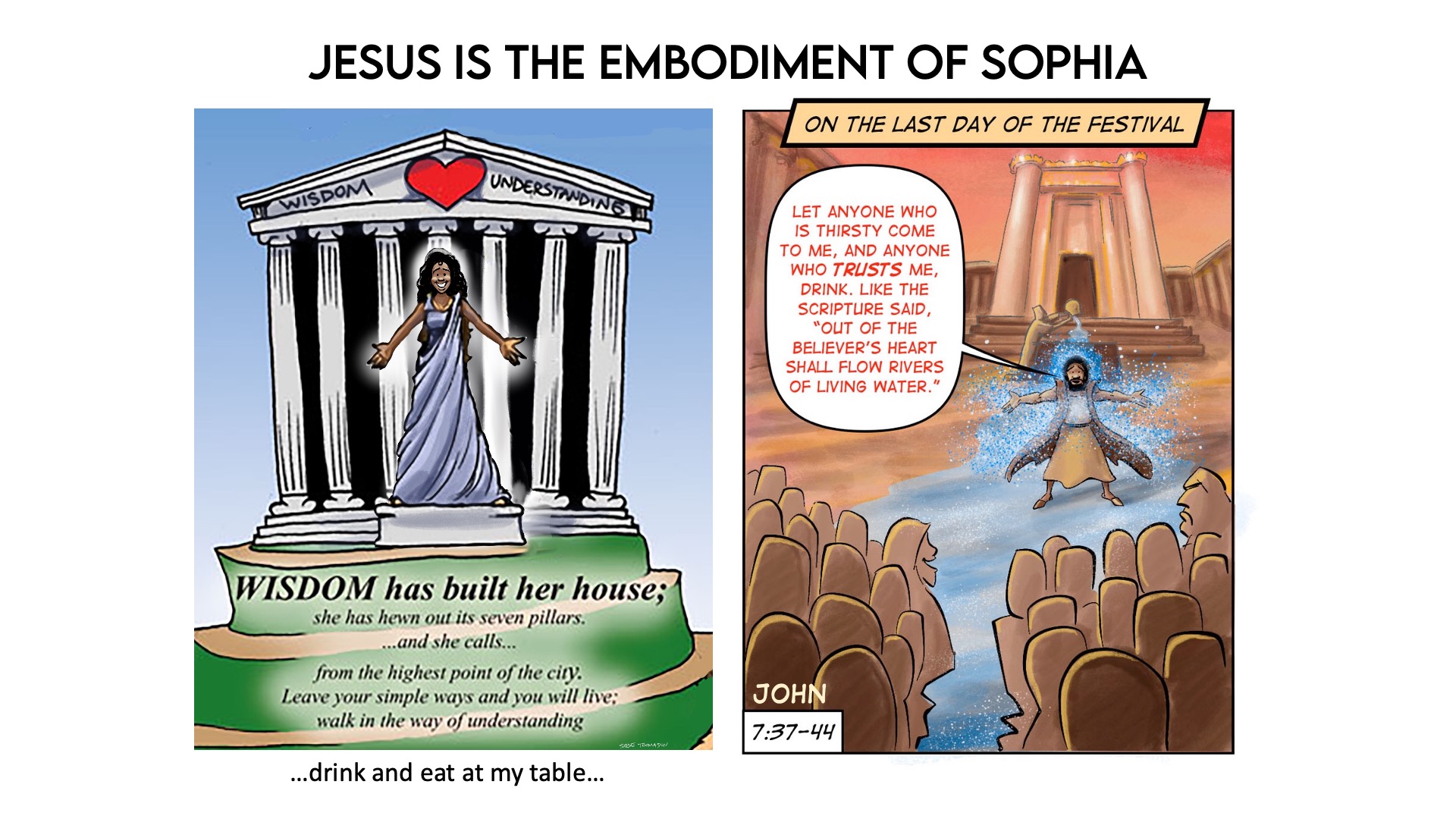
Jesus’ ministry was an invitation to people to grow up; to come home; to open their eyes and ears to see and hear what God is doing to bring about the abundant life.
Wisdom still calls to us today.
Jesus is the moving Tabernacle.
Do you remember how Jesus was introduced in John 1:14
John 1:14 (NRSV)
And the Word became flesh and tabernacled among us…
and then what Jesus said about himself back in John 2:19
“Destroy this temple, and in three days I will raise it up.”
Here Jesus stands in the city of Jerusalem while everyone is literally sleeping in tents for a week. He stands in the shadow of the magnificent building that the author of John and the readers of John know will be completely destroyed by the Romans.
One of the big questions on the minds of John’s readers was “How can we live as God’s people without a Temple?”
Jesus stands before them, challenging the power structures of the religious establishment and reminds them that God has always been on the move, leading the people through the wilderness.
It’s going to be OK.
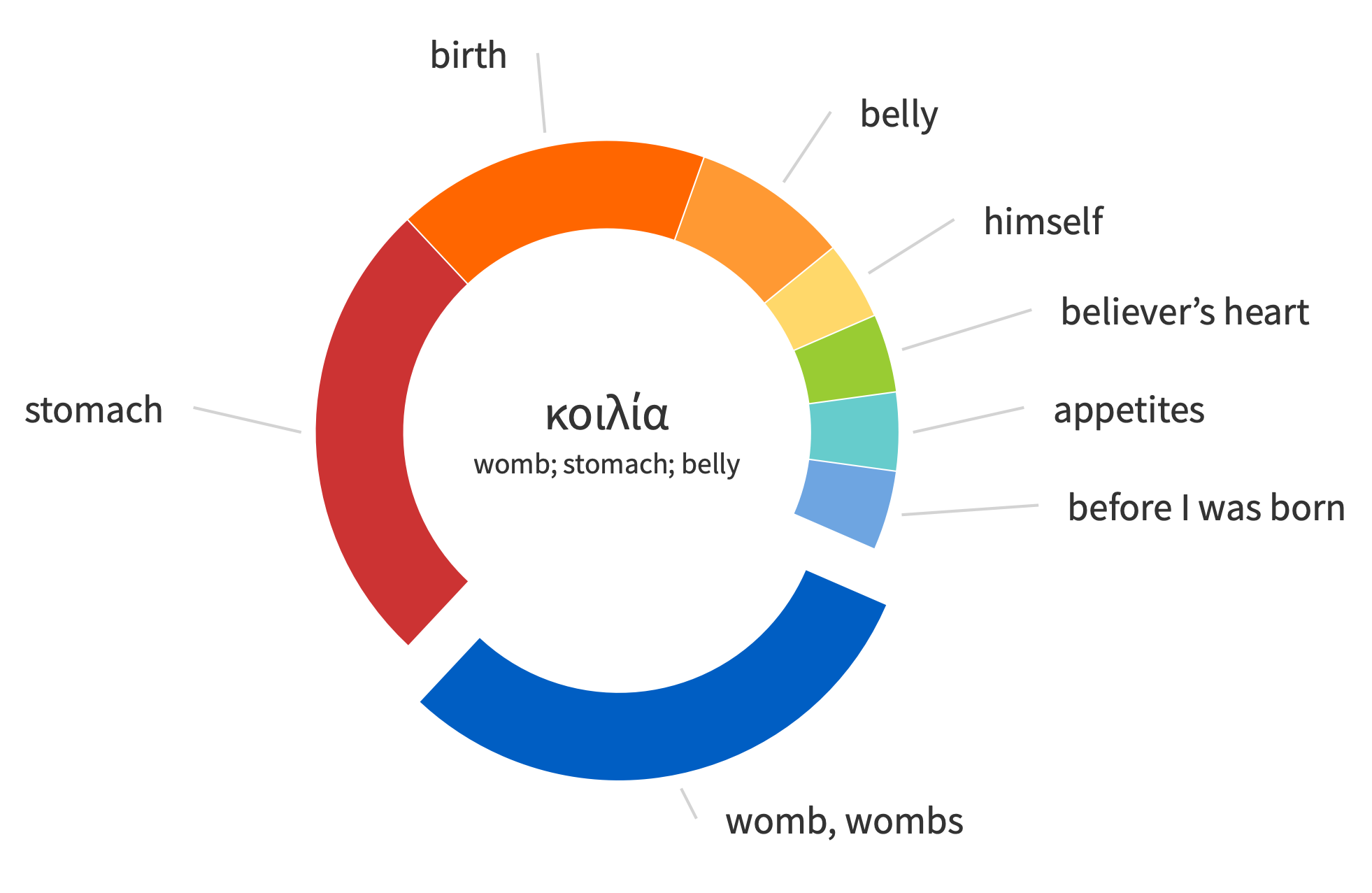
Jesus is the living water.
Look at John 7:38 again
As the scripture has said, ‘Out of the believer’s heart shall flow rivers of living water.’ ”
The word translated heart is the Greek word koilia.
It is fascinating to me that the team who translated the NRSV chose the word heart. Every other place the word koilia appears it either means stomach, or, and more importantly, womb.
When Elizabeth saw Mary, her baby John lept in her koilia.
Jesus was conceived in Mary’s koilia.
Jesus stands in the Temple and the author of John recalls the scripture and sayss,
“Streams of living water flow from his koilia.”
Do you see what’s happening here?
Jesus is life.
Jesus is new birth.
Jesus is God, our creator, our loving Father and Mother, our Wisdom, from whom life itself flows.
And then the author gives a spoiler alert. Jesus gives the Holy Spirit of God, which is our constant sources of life today.
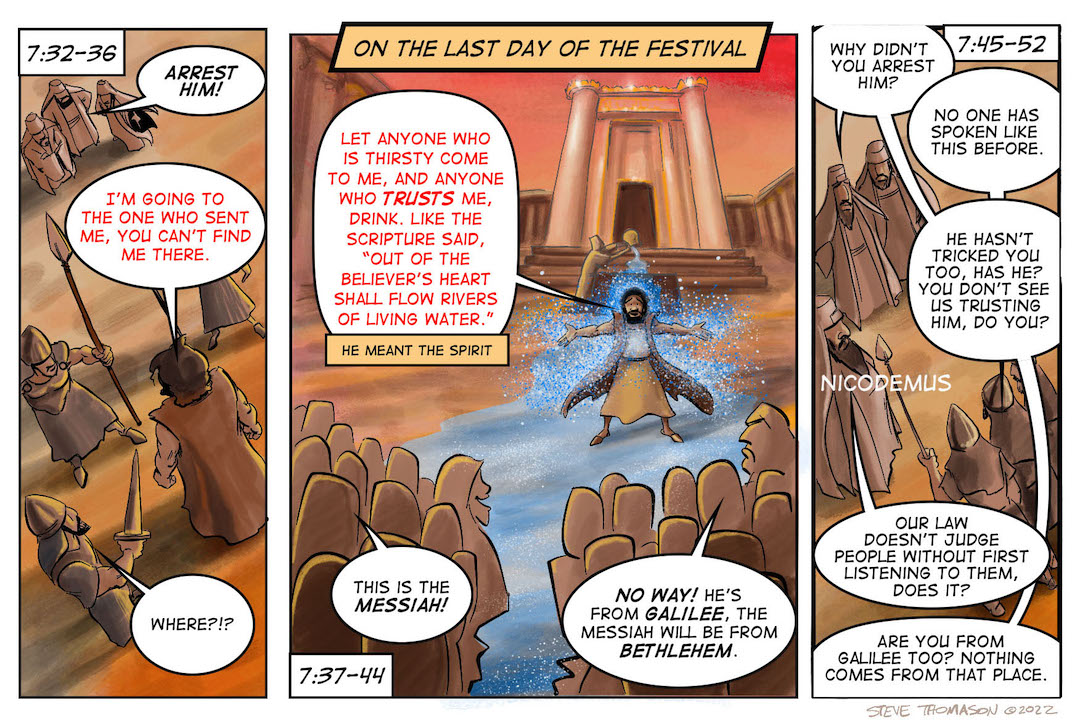
Conclusion
Remember who is hearing this story for the first time. Jewish people who trust that Jesus is the Messiah, but their world has fallen apart and their lives are at risk.
To them, and to us…
…this homeless teacher from the wrong side of the tracks wanders into town and challenges the power structures of the religious institution. He reminds the people that God doesn’t need a building, but God is always on the move, leading us through the wilderness. He calls out to anyone who will listen and says come home. Come to wisdom. Remember that you are a beloved child of God. No matter how much the world around you seems to be shaking and the authorities want to crush you.
I got you.
Download these images to use in your own teaching and preaching.
Explore Every Book of the Bible
Find cartoons, illustrations, videos, commentaries, and other helpful information about every book of the Bible.



Trust! He has “…got me (and you)” eternally!